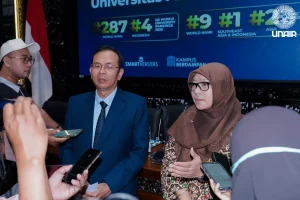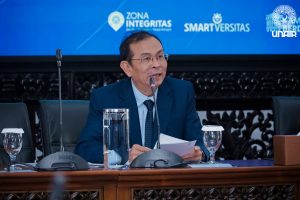UNAIR NEWS – The student robotics team from Universitas Airlangga (UNAIR), Team Astro_24, secured third place in the 2024 Indonesian Robot Contest (KRI). This prestigious annual event, organized by the National Achievement Center, was held at Universitas Muhammadiyah Surakarta from Monday to Friday, July 1-5, 2024.
The UNAIR contingent comprised core team members from Robotics and AI Engineering (TRKB) FTMM: Affa Ndaru Rabbany Wijaya, Wisnu Imam Satrio, Zinadine Zidan Alsyahana, and Stevanus Saut Hamonangan Gultom. They were supported by manager Jasmine Adlina Hapsari, and team members Jeffrey Nobel Martin, Wildan Fauzi, Muhammad Jundi Al Ghifari, and Khalisa Zahra Maulana.
Dean of FTMM Prof Dr Dwi Setyawan voiced his pride in the FTMM team’s accomplishments, stating that this achievement demonstrates the TRKB program’s practicality and readiness to tackle future challenges.
“This study program is one of the implementative programs to answer future challenges. The robots created are the results of their studies,” he said.
With the faculty’s growth, Prof Dwi aims that students should not only compete nationally but internationally. “We have complete classes, extensive learning, our target should not only domestic competitions, but also international ones,” he added.
Developing two robots
Affa Ndaru Rabbany Wijaya, known as Ndaru, explained that in the competition, Team Astro_24 participated in the Indonesian Thematic Robot Contest (KRTMI) division, which focused on waste management issues. The team developed two robots, Apin and Acil, each serving distinct functions.
“Apin is an autonomous robot equipped with a camera to detect and sort waste by type. Meanwhile, Acil is a manual robot designed to distribute the waste,” Ndaru detailed on behalf of the team.
Competition stages
The path to victory was challenging. Stevanus, a team member, noted that the team had to go through several selection stages, including document review, regional selection, and national selection.

At the national stage, the team was challenged to create two robots that could collaborate in sorting and distributing waste. The primary hurdle was adapting to the actual competition field conditions, which differed from the information provided.
“During the field inspection, we found many differences, such as varying conveyor heights and unstable vibrations. We had to quickly adapt to these conditions. Additionally, we experienced technical damage in the first test and had only 30 minutes to fix it,” Stevanus disclosed.
Adaptation, key to victory
The ability of Team Astro_24 to swiftly adapt and repair the robots under time constraints highlighted their competence in overcoming obstacles. Despite having fewer members than the previous year, Team Astro_24 managed to build larger robots.
“This year, there were only nine of us, and we were tasked with making two robots with dimensions of 80×90 cm, one of which had to be fully autonomous. This was very challenging because we had to build new robots from scratch this year,” Ndaru explained.
In conclusion, Ndaru expressed hopes that their accomplishments would continue to improve. “We hope we could make better future achievements that make FTMM and Universitas Airlangga proud,” he added.
Author: Venni Tanujaya
Editor: Yulia Rohmawati









